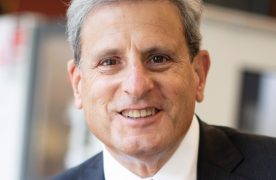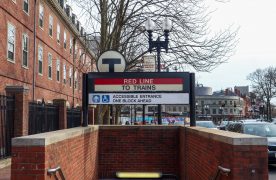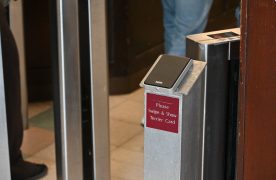Having been in office for just over two weeks, President Barack Obama has hit the ground running, creating one of the largest stimulus packages in United States history to combat what some economists are calling the worst recession since the Great Depression.
With $150 billion of the stimulus plan set to go toward education, if the bill passes, the country will see the largest increase in federal aid to education since World War II, which will largely impact students who rely on any type of financial aid, Dr. Phil Day, president of the National Association of Student Financial Aid Administrators said.
‘All in all the stimulus package is very, very good for students and student aid, and we have gone on record of supporting the House bill,’ Day said.’
While those in favor of the bill praise the large federal intervention into education, some economists said they are worried about too much government regulation, specifically in the student loan market.
‘It sounds nice to have limits, but there is a danger to overregulation,’ said Suffolk economics professor Jonathan Haughton, the senior economist at the Beacon Hill Institute for Public Policy.
Although the controversial stimulus package designates $150 billion for education, many students said they do not know as much as they would like about the stimulus and do not think it will affect them directly.
College of General Studies freshman Margaret Lapp said even though she thinks knowing about the economy will be important for students, especially after they graduate and enter the job market, it is hard for students to follow the news when they are busy with classes.
‘Trying to read the news when you have your own studies is hard to mix,’ she said. ‘I know a lot more kids that would rather spend their free time on Facebook than on CNN.com.’
WHAT TO KNOW ABOUT THE STIMULUS PLAN
As passed by the House of Representatives, the $819 billion stimulus plan is comprised of approximately two-thirds government spending and one-third tax cuts.’ As debated in the Senate, however, the cost of the bill has risen to nearly $884 billion because of further tax cuts and additional provisions attached to the legislation.
In addition to fulfilling Obama’s campaign promise of tax cuts for the middle class, the bill also includes an increase of unemployment benefits and money for items such as the expansion of broadband access, according to BarackObama.com.
As far as its contribution to education, the bill would provide an increase in federal grants, loans and educational tax credits, along with an increase in college work-study programs by $490 million.’ The bill would also affect the private loan market by helping financial institutions make themselves more available to students, while also forcing these lenders to accommodate to some additional consumer protection provisions, Day said.
If the plan is passed as drafted by the House of Representatives, the maximum amount of the Pell Grant ‘-‘- government aid that students do not have to pay back ‘-‘- would increase by $218 for the 2009-10 academic year and another $400 for the 2010-11 academic year, making the total maximum of the grant around $5,350, Day said.
According to the Senate Appropriations Committee’s website, the $13.9 billion increase in Pell Grant funding would help an estimated seven million needy students pay for higher education.
‘The higher we can get that Pell Grant, the better,’ Day said. ‘The more of a push we put in that means that students don’t have to get too much in debt by taking out loans.’
In addition to increasing federal loans and grants, the stimulus plan would also extend the educational Hope Credit to nearly four million low-income students and make the tax credit more valuable to millions of middle-income students, according to a February report by the Center on Budget and Policy Priorities.
Currently, the Hope tax credit provides up to $1,800 in tax credit toward the first two years of higher education only to families with a singular provider who makes less than $58,000 a year, according to the Internal Revenue Service website.
For people with a very low modified adjusted gross income, however, the tax credit currently only covers the amount they pay in taxes, and they cannot be credited for any additional amount that exceeds their income tax level, according to the website.
Therefore, a person who may only pay $1,000 in taxes can only be given up to that amount in tax credit toward higher education.’
If the House bill is passed, the maximum tax credit students could receive would rise to $2,500, and they would be able to claim the credit a maximum of four years instead of two, according to the CBPP report.
Additionally, the Hope tax credit would be made partially nonrefundable, meaning that even if families make too little to owe large federal income taxes, they can still receive the credit amount that exceeds their tax liability, as stated the CBPP report.’
HOW MUCH’ IS TOO MUCH INTERVENTION?
While most education professionals said they agree that any increases in federal aid are beneficial to needy students, controversy has arisen over how much the government should intervene in the private student loan market.
While students can take out federal loans with relatively low interest rates and flexible repayment options, private loan companies oftentimes require much higher interest rates and are more strict with higher repayments and sooner deadlines, Haughton said.
The stimulus plan drafted by the House contains regulatory provisions on student loan companies, such as requiring banks to put caps on their interest rates and allow more income-based repayment options, he said.
Though Haughton said any increase in federal aid is a good thing, he is ‘not convinced’ the government’s intervention into the private student loan market will help students, but said it might do more harm than good.
‘Too many regulations may mean that fewer students are able to borrow because banks will be stricter about who they are lending to,’ he said. ‘I’m not convinced there’s a problem in the student loan market that the government needs to fix.’
Haughton said in addition to the increase in federal grants, the stimulus plan would help more students afford college indirectly by boosting the job market.
‘Any spending that can come quickly, such as providing funds for state and local governments, so they don’t have to cut back so much, would help parents who are trying to pay tuition.’
Though Day also stressed the importance of federal financial aid and spending, he said regulation over the student loan market was essential in protecting students who choose to borrow from private lenders.
‘Right now money is cheap, and banks can borrow money at a reasonable rate [because the Federal Reserve has lowered interest rates], ‘ Day said. ‘We don’t want them giving these loans at high rates, and the federal government ought to ensure that student protections are there.’
Although Day thinks regulations are necessary in the private loan market, he said students should exhaust all other options with federal financial aid before turning to the private sector.
‘My advice to students would be to go in and talk to their financial aid office before getting any kind of private loan,’ he said.’
WHAT DO STUDENTS KNOW?
Even as politicians argue over how the stimulus can best help students pay for college, most students admitted they do not know as much as they would like about the stimulus plan.’
College of Fine Arts sophomore Liz Walbridge said though she knows the ‘basics’ of the stimulus plan and knows Obama is spending a significant amount of money on education, she regrets that she hasn’t looked up more information about it.
‘We definitely don’t talk enough about this,’ Walbridge, who is also in the College of Arts and Sciences, said. ‘People get so focused in school, they don’t really pay attention to what’s going on.’
Sargent College of Health and Rehabilitation Sciences senior Daniel Farnand also said even though he does not yet know too much information about the stimulus package, he has every intention of looking up more information.
‘One of the biggest problems in this country is ignorance in general,’ Farnand said. ‘The only way to fight ignorance is by being informed.’
Although Lapp said she does not think she knows enough about the current economic situation and the stimulus plan, she said students should understand the importance of being well informed about important political and economic issues.
‘This crisis will end up on our shoulders soon,’ she said. ‘We should make sure we know more about it before going out into the world.’
This is an account occasionally used by the Daily Free Press editors to post archived posts from previous iterations of the site or otherwise for special circumstance publications. See authorship info on the byline at the top of the page.














What about allowing student loans to be discharged in bankruptcy? When people fall on hard times they should have the right to file bankruptcy. It is something that other generations have benefited from. It is something that should be retroactively restored. We have people that have nothing, that filed bankruptcy and their lives are destroyed because they still have student loans they owe that could not be placed on the bankruptcy. Bankruptcy should provide a fresh new start, not a partial start.<p/>Today, you must have a college degree to have any hope. Years ago you could make it with a high school degree. So it made sense to say we will only pay for school up to college, but the rest is up to you (BTW there was much more aid available for college back then as well). Today, too many college students get degree that become worthless. They do not provide any better life than if they never got the degree in the first place. <p/>Allow student loans to be discharged for anyone that has already filed bankruptcy or will be filing. That helps the people…not the banks.
What about lowering the rate for student loans? It seems to me lowering the rate for students on their student loans would only help the economy. The graduates would have more money to spend instead of paying a high payment each month. Give the grad a chance. The banks are adults that have been working in the work force for years shame on them they should know better. Grad should be bailed out first.
That’s all great if your currently attending college or planning on attending college, but what about those who have completed their degree and experiencing the full weight of their loan repayment?
Great. Glad it’s good for students on financial aid, but what about the rest of the nation? And, perhaps there are other things he should be focusing in addition to the economy. Like healthcare. Housing. Insurance. What do you think? This website asks what you would like to see Congress and Obama tackle first in his first 100 days in office. Definitely check it out